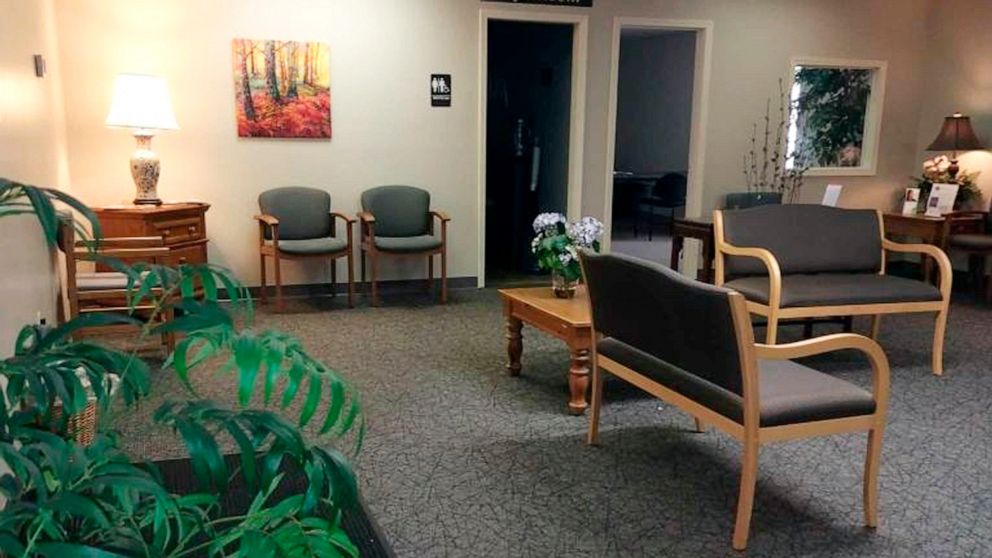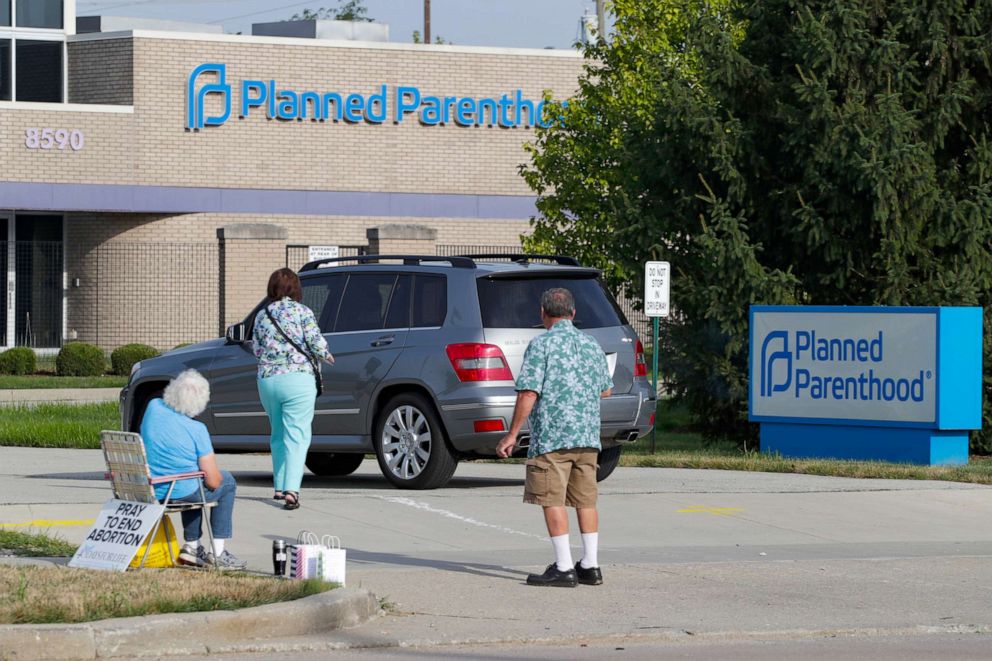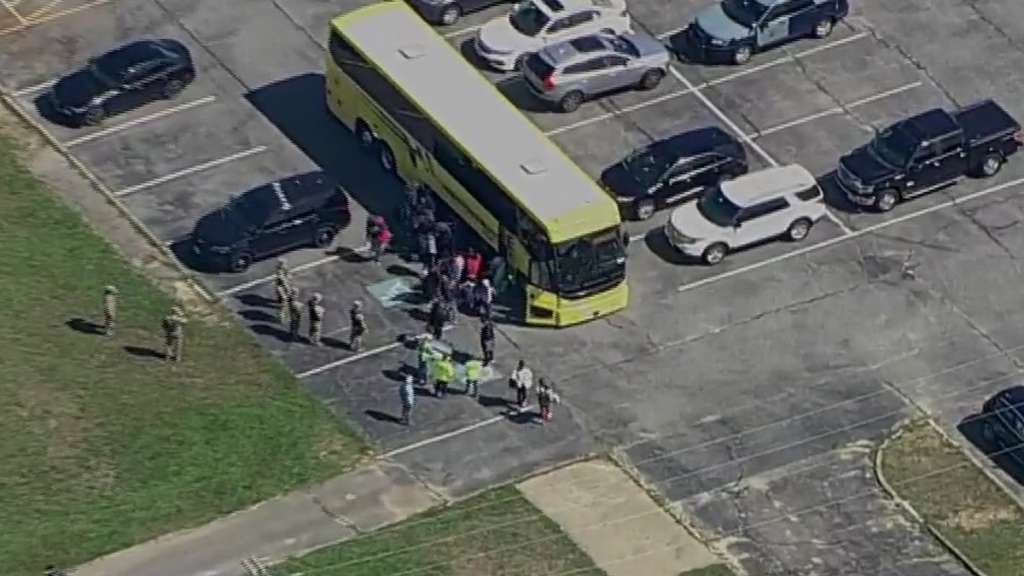
With Indiana’s ban now in effect, patients seeking abortion have to travel even further
[ad_1]
With Indiana’s abortion ban in place, patients from in and out of state will likely have to travel even further to get access to care, providers say. Patients will now likely travel to Illinois or Ohio, where abortions have temporarily resumed as a lawsuit challenging the ban continues.
Abortion clinics in Indiana and Illinois saw an influx in patients in the days leading up to Indiana’s ban going into effect Sept. 15. A hearing Sept. 19 could temporarily allow abortions to resume in the state. This is part of an ongoing lawsuit filed by abortion providers challenging the legality of the ban under Indiana’s state constitution.
Indiana’s ban makes it a felony to provide abortion services and only allows for limited exceptions. Abortions up to certain stages in pregnancy are permitted if the woman’s life is in danger, the fetus is diagnosed with a fatal anomaly or if the pregnancy was a result of rape or incest. Providers who violate the ban will have their license revoked and could face between one to six years in prison and a fine of up to $10,000.
Dr. Katie McHugh, an abortion provider who works at several Planned Parenthood clinics and at one of two independent clinics in Indianapolis, said clinics she works at saw a surge in patients coming from Indiana and from out of state.
“People are so nervous to be pregnant in Indiana right now,” McHugh told ABC News.

This image provided by Women’s Med, an abortion clinic in Indianapolis, shows the clinic empty on Sept. 15, 2022, the day the state’s abortion ban went into effect.
Women’s Med via AP
McHugh said the number of patients an independent clinic she works at saw between June and Sept. 15 doubled, compared to the same period last year. More patients were also choosing to obtain surgical abortions, over medication abortions, fearing that they would need follow-up care after the ban went into effect if they have any complications with the abortion pill regimen, McHugh said.
McHugh said she also witnessed “dramatically different” patient behavior in the last two weeks. Patients were more angry, anxious and outspoken about their feelings. McHugh said this is drastically different than what she was used to seeing; she is more used to reassuring patients.
Because Indiana has a waiting period, McHugh said since Wednesday the clinics she works at have been referring patients calling to book their first appointment to other clinics outside the state.
Patients will now have to travel to other states, such as Illinois or Michigan, to receive abortion care, McHugh said. From Indianapolis, women would have to drive two hours to reach care in Dayton, Ohio, where abortion is temporarily available pending an ongoing lawsuit, or drive two hours to Champaign, Illinois, she said.
Two independent abortion clinics in Indianapolis will close if a lawsuit challenging the legality of Indiana’s abortion ban fails to suspend its implementation. Planned Parenthood and an independent clinic called Women’s Med will stay open, to offer patients other reproductive care services and referrals to receive care in other states, McHugh said.
While Indiana’s ban does allow few exceptions, these abortions must all happen at licensed hospitals; the ban removes the licensing class from abortion clinics, prohibiting them from providing any kind of abortion care. So access will be limited even to patients who can legally obtain an abortion as the state reduces the number of sites where patients can receive abortion services.
Abortion care at hospitals is more expensive and takes longer time. The further along in pregnancy, an abortion procedure is “inherently more dangerous,” McHugh said.
While some patients would be able to wait to receive abortion care, others could be harmed by waiting as things can change very quickly in pregnancy, McHugh said.
Planned Parenthood of Illinois said it had been preparing for the U.S. Supreme Court’s decision to overturn Roe v. Wade and for additional restrictions on abortion in many states for years. In anticipation of the influx of patients traveling out of Indiana for care, its been working to increase capacity at its clinics, even announcing an expansion of its Champaign Health Center to facilitate access to double the amount of patients it can currently see.
In Illinois, Planned Parenthood anticipates it will see an surge of between 20,000 to 30,000 additional patients from out of state over the next year, Kristen Schultz, Planned Parenthood of Illinois’ chief strategy and operations officer, told ABC News.
“In recent months, we’ve seen about a doubling of patients from Indiana, but we anticipate that to increase severely over the next weeks and months, probably to a 10-fold increase,” Schultz said.

Abortion protesters attempt to hand out literature as they stand in the driveway of a Planned Parenthood clinic in Indianapolis, on Aug. 16, 2019.
Michael Conroy/AP, FILE
Patients in states where bans are already in place will likely have to continue to travel even further for care now that it is unavailable to them in Indiana, Schultz said.
She added, “Patients were being seen in Indiana from surrounding states and now their journey will increase by several 100 miles and probably several hours to take the extra step to make it to Illinois.”
When Roe was overturned, an 1846 Wisconsin state law banning abortions went into effect. Planned Parenthood of Illinois said it has seen a 10-fold increase in patients coming from Wisconsin since abortions stopped in the state.
“Now, nearly 30% of our overall abortion patients traveled to Illinois from another state. So even in the last two months, we have seen abortion patients from 28 states outside of Illinois,” Schultz said.
Historically, patients have traveled to Illinois for care from places like Wisconsin, Indiana and Missouri, but now they’re coming from farther states including Texas, Kentucky, Iowa, Arkansas, Alabama, Mississippi, Louisiana and Florida, Schultz said.
Despite this influx in patients, Schultz said wait times at Planned Parenthood’s Illinois clinics have remained the same since Roe was overturned. Wait times depend on the type of abortion care a patient needs, but Schultz said many can get care within a couple of days and in some cases they have to wait more than a week.
Restrictions on abortions have varying effects on patients, but some of the things Planned Parenthood is seeing include patients flying in for the first time to get care, patients needing childcare and patients asking for gas cards as gas prices have gotten more expensive, Schultz said.
Schultz said abortion restrictions will likely disproportionately effect disadvantaged people.
“Not everyone has the resources and opportunities to travel for an abortion, these patients who already faced immense barriers to care are the most likely to be further harmed by restrictive state laws and bans like we’re seeing in Indiana,” Schultz said.
[ad_2]
Source link


